The 6 Very Best Blue-Light-Blocking Glasses
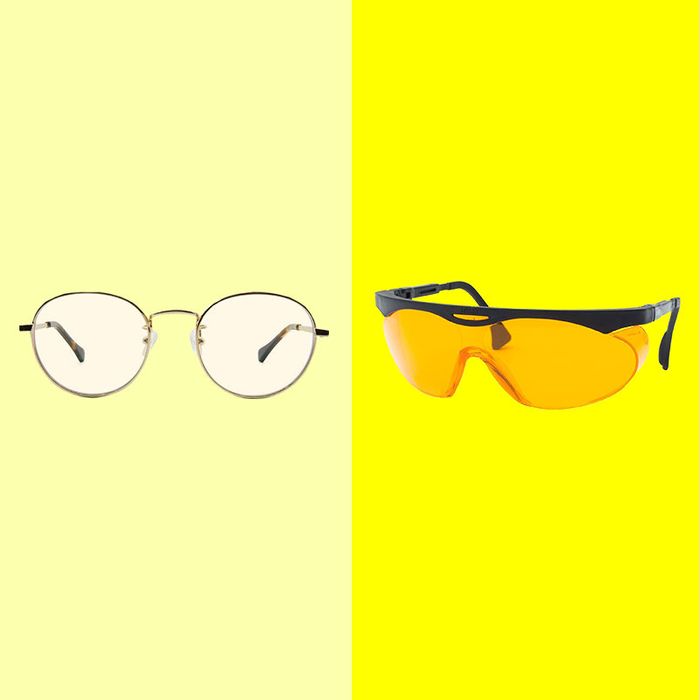
Photo-Illustration: The Strategist; Photos: Retailers
If you’ve ever suffered from dry, irritated eyes after a long day of staring at your computer, you may have been tempted to purchase a pair of blue-light-blocking glasses. If so, you’re certainly not alone. According to a survey by the Vision Council, a group that represents eyeglasses manufacturers, almost 60 percent of Americans experience some symptoms of digital eye strain due to extended time in front of a screen (and that was even before the pandemic started). As a result, a cottage industry of blue-light-filtering glasses has emerged.
According to Rahul Khurana, an ophthalmologist and clinical spokesperson for the American Academy of Ophthalmology, digital eye strain and the negative effects of blue light on your eyes are two separate concerns. “We keep on thinking about blue light from our computers and smartphones, but the reality is that we get more exposure to blue light from the sun.” Essentially, it’s not the blue light that’s making your eyes feel bad after a day of staring at the computer; it’s staring at a screen for hours without breaks. That’s why Khurana doesn’t recommend any special eyewear for daily computer use. “Ultimately, I’m not really sure how it’s going to help with digital eye strain, which is what’s bothering people,” he says, explaining that the digital eye strain most people experience can occur “whenever you focus on anything — from reading a book, looking at a screen, or watching TV.” It can be alleviated by shifting your eyes every 20 minutes or so onto something that’s 20 feet away for at least 20 seconds, he says. If that doesn’t help, Khurana recommends artificial tears to help lubricate dry eyes. In the end, he says you don’t need to wear blue-light-blocking glasses during the day.
When blue-light-blocking glasses can be most useful is at night, as blue light from screens can disrupt natural sleep patterns. Our bodies associate blue light with daytime, so being exposed to it when you’re trying to go to bed “pushes our internal clocks later so that it’s harder to fall asleep and harder to wake up in the morning,” says Cathy Goldstein, associate professor of neurology at the University of Michigan Sleep Disorders Center.
In a perfect world, you’d start to avoid blue light from screens four hours before bedtime. But if you can’t tear yourself away from Instagram or the dreaded doomscroll before you turn in for the night, blue-light-blocking glasses can help. To find the most effective and stylish options, we scoured the internet and spoke with eye doctors about what they recommend and when to wear them.
Best overall | Best with clear lenses | Most stylish tinted lenses | Best reading glasses | Best clip-ons | Best for kids
What we’re looking for
Blue-light-blocking capability: All light is measured in nanometers (nm), and blue-light wavelengths that can have the most impact on your melatonin levels (and thus affect your sleep) range from 400 to 500 nm. Blue-light-blocking glasses work by absorbing those wavelengths to stop them from reaching your eyes. (Note that despite emitting blue light, most consumer tech is not harmful, and there is no scientific evidence that digital devices can damage your eyes.)
Many blue-light-blocking glasses have an orange or yellow tint that is supposed to absorb the blue light while allowing other light to pass through. Generally, the darker the lenses on a pair of blue-light-blocking glasses, the more blue light is blocked. While there are clear or less obviously tinted blue-light-blocking lenses, they won’t filter as much blue light as darker options.
Anti-glare coating: Blue-light-blocking glasses may have anti-glare coating, which decreases the amount of light reflecting from your glasses to further reduce eye strain and make them more comfortable to use. This is especially handy during video calls where people are going to be looking at you for long periods of time.
Since the best time to use blue-light-blocking glasses is in the evening or right before bed (which means you’re unlikely to wear them out of the house), the function-first, orange-tinted design of many pairs will suffice for a lot of people. But if you hate the look of the orange tint, we’ve found some blue-light-blocking glasses with almost clear lenses — as long as you’re willing to sacrifice some of their light-filtering capabilities.
Frame material: There are different frame materials to choose from including wire, plastic, and acetate, depending on how stylish you want to get. If you don’t already wear prescription or reading glasses, any pair of blue-light-blocking glasses will be easy to pick up and use. But if you do, you’ll want to look for either a prescription pair, reading glasses with blue-light-blocking capabilities, or something that will clip onto or fit over the top of your existing glasses.
Prescription requirement: While you don’t need a doctor’s prescription to get a pair of these glasses, some lenses and frames are compatible with prescription lenses, so you won’t have to switch between the two and sacrifice vision for comfort. We’ve noted which are simply nonprescription and which can work with your existing or new prescriptions.
Best overall blue-light-blocking glasses
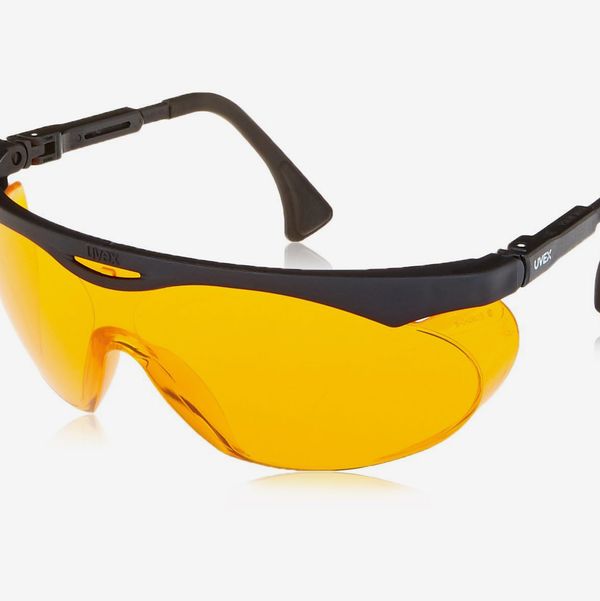
Uvex Skyper Blue Light Blocking Computer Glasses with SCT-Orange Lens (3-Pack)
$36
Block 98 percent of blue light, orange-tinted lenses | No anti-glare coating | Plastic | Nonprescription
If you want to use the same blue-light-blocking glasses that researchers use in the lab, go for Uvex. “They’re usually less than $10, and these have been used in studies,” says Goldstein. “It’s shown that when you use these, the light doesn’t suppress your melatonin, so the glasses can improve sleep.” They’re not as nice-looking as some of the other blue-light-filtering glasses out there, but since the best time to use them is right before bed (and not at the office), there’s no reason to be embarrassed. The Uvex glasses come in a pack of three pairs, so you can keep them in multiple places or have a spare on hand if you lose or break one.
$36
at Amazon
$36
at Amazon
Best clear-lens blue-light-blocking glasses
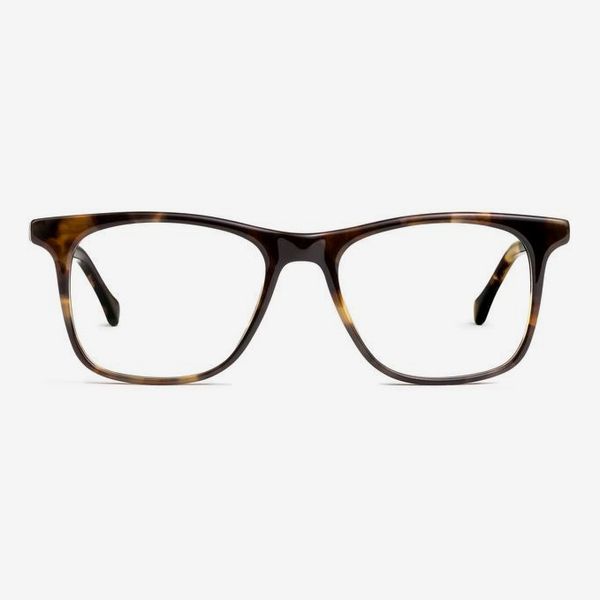
Felix Gray Jemison Eyeglasses
From
$100
Block 50 percent of blue light, virtually clear lenses | Anti-glare coating | Plastic | Nonprescription, prescription, or readers
If you’d prefer more subtle-looking blue-light-blocking glasses, there are quite a few companies making versions with nearly transparent lenses and stylish frames. This pair comes from Felix Gray — a brand that helped popularize the idea of wearing blue-light-blocking glasses at the office (despite the inherent limits of wearing them during the day). Felix Gray says these “daytime” glasses filter more than 50 percent of the blue-light spectrum and more than 90 percent of the most impactful wavelengths emitted by smartphones, laptops, and tablets. They have anti-glare coating to reduce eye strain and are available with prescription lenses or as reading glasses. If you don’t like the Jemison design, there are several more to choose from — including round-frame, metal-frame, and even low-bridge-fit styles.
From
$100
at Felix Gray
Most stylish tinted-lens blue-light-blocking glasses
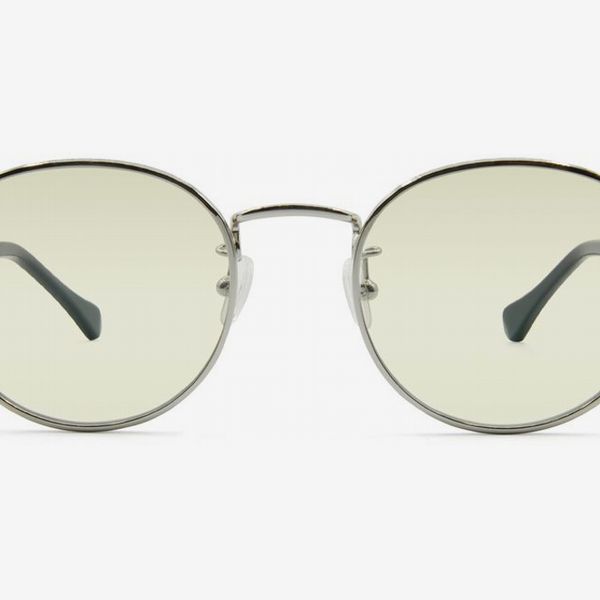
Felix Gray Hamilton Sleep Glasses
$110
Block 62 percent of blue light, lightly tinted yellow lenses | Anti-glare coating | Wire | Nonprescription, prescription, or readers
Felix Gray makes blue-light-filtering glasses in many of the same styles as its clear “daytime” glasses except with tinted “amber” lenses that filter a higher percentage of blue light and will be more effective — especially at night. The glasses are intended to let you do whatever you want in the precious hours before bedtime (scroll through social media, watch YouTube) without the blue light affecting your sleep. While the clear glasses block 50 percent of all blue light, the tinted glasses block 62 percent. The tinted lenses specifically target the range of blue light that impacts melatonin, which is why they’re recommended for use before sleep. “It doesn’t seem like a major difference on paper, but the lenses of the amber glasses have a noticeably stronger yellow tint,” says Strategist editor Maxine Builder. “The overall effect when you put them on isn’t too distorting. Everything just looks a little less bright — like someone dialed down the lights.” The glasses have anti-glare coating and are available with nonprescription, prescription, or reading lenses.
$110
at Amazon
$110
at Nordstrom
Best blue-light-blocking reading glasses
Best clip-on blue-light-blocking glasses
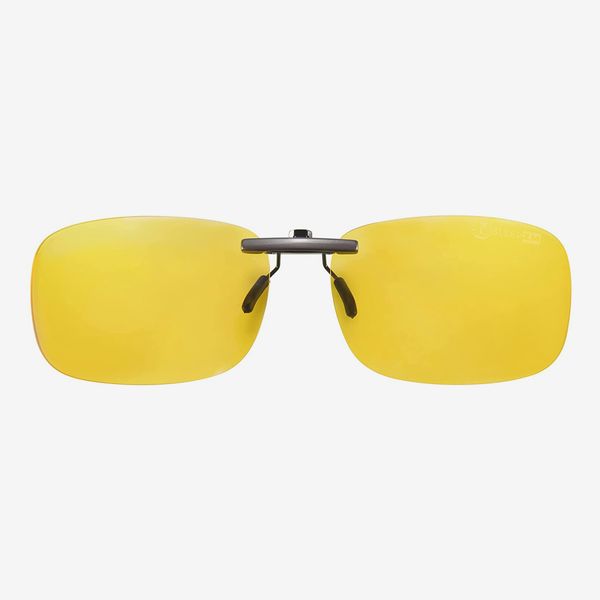
Sleep ZM Clip On Anti Blue Light Blocking Computer Glasses
$40
Block 87 or 99 percent of blue light depending on tint, yellow-tinted or orange-tinted lenses | Anti-glare coating | Metal clip | Nonprescription
If you already wear prescription glasses, you might appreciate this pair that clips onto your existing frames to block up to 99 percent of blue light — depending on whether you chose yellow- or orange-tinted lenses. One enthusiastic Amazon reviewer reports that they “fit securely onto my night glasses without having an obnoxious or clunky nose guard that I’ve seen in other competitive brands” and do “a great job staying in place on my frames.” Another reviewer reports experiencing significantly less eye strain while watching television or using the computer and says the glasses allow them to rest more easily at night.
$40
at Amazon
$40
at Amazon
Best blue-light-blocking glasses for kids
Our experts
• Maxine Builder, Strategist editor
• Cathy Goldstein, associate professor of neurology at the University of Michigan Sleep Disorders Center
• Viola Kanevsky, optometrist at Acuity NYC
• Rahul Khurana, ophthalmologist and clinical spokesperson for the American Academy of Ophthalmology
• Milan Ranka, ophthalmologist at Pediatric Ophthalmic Consultants
• Brook Sheehan, chiropractor and parent
get the strategist newsletter
Actually good deals, smart shopping advice, and exclusive discounts.
This site is protected by reCAPTCHA and the Google Privacy Policy and Terms of Service apply.
The Strategist is designed to surface the most useful, expert recommendations for things to buy across the vast e-commerce landscape. Some of our latest conquests include the best acne treatments, rolling luggage, pillows for side sleepers, natural anxiety remedies, and bath towels. We update links when possible, but note that deals can expire and all prices are subject to change.
Every editorial product is independently selected. If you buy something through our links, New York may earn an affiliate commission.















![Toni Kroos là ai? [ sự thật về tiểu sử đầy đủ Toni Kroos ]](https://evbn.org/wp-content/uploads/New-Project-6635-1671934592.jpg)


